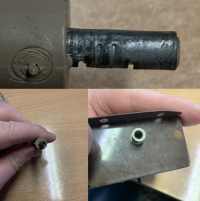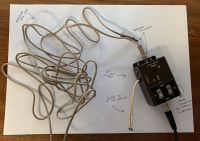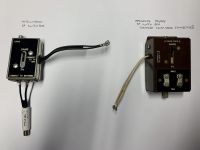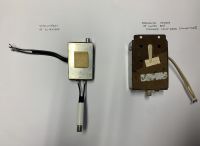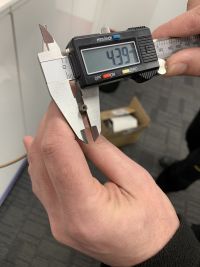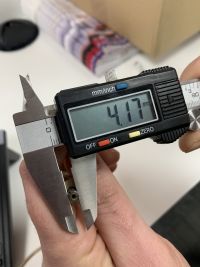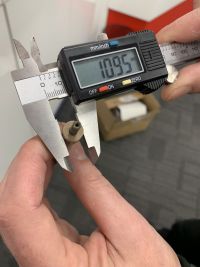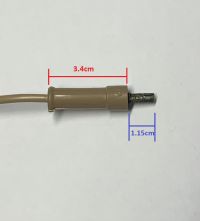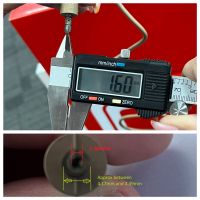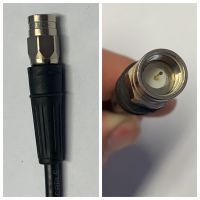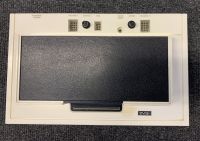Odyssey:Video Output Notes: Difference between revisions
| (14 intermediate revisions by the same user not shown) | |||
| Line 1: | Line 1: | ||
{{Warning|DRAFT (WORK IN PROGRESS ARTICLE - PLEASE DO NOT RELY ON THE INFORMATION BELOW UNTIL MARKED AS COMPLETED)}} | |||
The Magnavox Odyssey outputted video via an RF connection, using a proprietary Game Cable which is approximately 15 feet in length. There are currently options that allow the user to output a better quality, or more reliable signal, however these options all have pros/cons and some may not be easy to reproduce for various reasons. | The Magnavox Odyssey outputted video via an RF connection, using a proprietary Game Cable which is approximately 15 feet in length. There are currently options that allow the user to output a better quality, or more reliable signal, however these options all have pros/cons and some may not be easy to reproduce for various reasons. | ||
==Original Video Cable & Odyssey RF Switch Box== | ==Original Video Cable & Odyssey RF Switch Box== | ||
Originally, the Odyssey Game Cable would connect to the console via a proprietary connector, which is not commonly used anymore. These connectors are known to have been used by the original Magnavox Odyssey as well as | Originally, the Odyssey Game Cable would connect to the console via a proprietary connector, which is not commonly used anymore. These connectors are known to have been used by the original Magnavox Odyssey as well as the [https://en.wikipedia.org/wiki/Odyssey_series Odyssey series] of dedicated consoles released in the 1970s. The other end of the Game Cable (using the same type of connector) would then be connected to an old-style mechanical TV RF-switch box called the [[Odyssey:Magnavox_Odyssey_Antenna-Game_Switch|Antenna-Game Switch]]. | ||
The Antenna-Game Switch had a slide lever that allowed the user to switch between using the Odyssey console and receiving signals from a remote television station. When "Game" mode was selected, the RF switch box output the console's video signal through a pair of fork connectors (also known as crimp spade connectors), which were connected to two screws found on the [https://commons.wikimedia.org/wiki/File:Philco-Ford_Orange_Retro_TV_(1970s)_antenna_connectors.jpg antenna terminal] on the back of the TV. The process is shown in this 1972 Magnavox Odyssey promotional film ([https://www.youtube.com/watch?v=jLGBtkKPj2U&t=45s Link]). | |||
There is some extra equipment a user requires to make this RF output method somewhat practical. If they own a vintage television from the same time period, this may have the archaic antenna terminals needed for the fork connectors to hook onto. Alternatively, spade connector to coax adapters (also known as [https://www.showmecables.com/300-to-75-ohm-separator-combiner-balun 300 to 75 Ohm separators]) are available, which can take the RF signal from the [[Odyssey:Magnavox_Odyssey_Antenna-Game_Switch|Antenna-Game Switch]] and output it to coaxial cable. The coaxial cable can then output to an RF-capable television, or an RF-to-composite demodulation solution, such as a VCR. | |||
In the modern era, this output method is arguably the most impractical, and may be prone to more interference than an RF signal which is output directly from the console using coaxial RF connections. Additionally, the Antenna-Switch boxes are approximately 50 years old, with their metallic components being prone to rust and related damage. | |||
[[File:Closeup of Odyssey proprietary connector.png|200px]] | [[File:Closeup of Odyssey proprietary connector.png|200px]] | ||
| Line 13: | Line 22: | ||
[[File:Odyssey vs Intellivision switch box comparison (rear).jpg|200px]] | [[File:Odyssey vs Intellivision switch box comparison (rear).jpg|200px]] | ||
On the positive side, the [https://en.wikipedia.org/wiki/Odyssey_series Odyssey series] of dedicated consoles use the same proprietary connector for their RF signal as the original Odyssey (so does some early models of the Odyssey 2), as well as RF switch boxes which are similar to the [[Odyssey:Magnavox_Odyssey_Antenna-Game_Switch|Antenna-Game Switch]]. | On the positive side, as noted above, the [https://en.wikipedia.org/wiki/Odyssey_series Odyssey series] of dedicated consoles use the same proprietary connector for their RF signal as the original Odyssey (so does some early models of the Odyssey 2), as well as RF switch boxes which are functionally similar to the [[Odyssey:Magnavox_Odyssey_Antenna-Game_Switch|Antenna-Game Switch]]. So a modern user may have some options available in obtaining a suitable replacement for their original unit. | ||
==Paperclip trick== | ==Paperclip trick== | ||
| Line 23: | Line 32: | ||
The original Odyssey cables and RF switch boxes may be difficult to find in standalone online sales, and may have to be purchased as part of a complete Odyssey console set. If this is prohibitive, the user could consider fashioning a modern replacement cable. Well-shielded coaxial cable, such as the RG-59, or the later RG-6 models, can work for this purpose. To ensure quality, upon stripping back the cable, the user should see that the cable has metal foil on the outside, as well as a wire mesh and a thick solid conduit in the middle, surrounded by foam. | The original Odyssey cables and RF switch boxes may be difficult to find in standalone online sales, and may have to be purchased as part of a complete Odyssey console set. If this is prohibitive, the user could consider fashioning a modern replacement cable. Well-shielded coaxial cable, such as the RG-59, or the later RG-6 models, can work for this purpose. To ensure quality, upon stripping back the cable, the user should see that the cable has metal foil on the outside, as well as a wire mesh and a thick solid conduit in the middle, surrounded by foam. | ||
A very high quality version of the above coaxial cable, such as the [https://www.bluejeanscable.com/store/shopbycable/1505A.htm Belden 1505A RF Cable] (from Blue Jeans Cable) may result in less RF interference on-screen. However these cables may be more expensive than arguably superior solutions, such as a good-quality composite mod. | A very high quality version of the above coaxial cable, such as the [https://www.bluejeanscable.com/store/shopbycable/1505A.htm Belden 1505A RF Cable] (from Blue Jeans Cable) may result in less RF interference on-screen. However these cables may be more expensive than arguably superior solutions, such as a good-quality composite mod. | ||
| Line 29: | Line 39: | ||
Once the user has obtained an appropriate length of RG-6 or other coaxial cable (the original Odyssey Game Cable is approximately 15 feet in length) and some heads, they will need to snip the end off the new cable, pull the foil back, attach a new connector and crimp them using a crimping tool. The difficulty level of this task should be somewhat lower than making DIY SCART cables, or CAT6 networking cable. | Once the user has obtained an appropriate length of RG-6 or other coaxial cable (the original Odyssey Game Cable is approximately 15 feet in length) and some heads, they will need to snip the end off the new cable, pull the foil back, attach a new connector and crimp them using a crimping tool. The difficulty level of this task should be somewhat lower than making DIY SCART cables, or CAT6 networking cable. | ||
If the user has an original Odyssey Game Cable where the actual cable has been irreparably damaged but the proprietary connectors are in good condition, these connectors could be crimped to the brand new coaxial cable. | If the user has an original Odyssey Game Cable where the actual cable has been irreparably damaged but the proprietary connectors are in good condition, these connectors could be crimped to the brand new coaxial cable. | ||
[[File:Measurement1.jpg|200px]] [[File:Measurement2.jpg|200px]] The diameter of these connectors varies slightly between 4.17mm and 4.39mm (see left). | [[File:Measurement1.jpg|200px]] [[File:Measurement2.jpg|200px]] | ||
The diameter of these connectors varies slightly between 4.17mm and 4.39mm (see left). | |||
[[File:Large measurement.jpg|200px]] | |||
When the measurement includes the plastic casing around the connector, the diameter is approximately 10.95mm | |||
[[File:Odyssey tip measurements.jpg|200px]] The length of the plastic casing around the proprietary connector is 3.4cm, and the length of the metal tip is 1.15cm. | [[File:Odyssey tip measurements.jpg|200px]] | ||
The length of the plastic casing around the proprietary connector is 3.4cm, and the length of the metal tip is 1.15cm. | |||
[[File:Odyssey internal measurements.JPG|200px]] | |||
The internal diameter of the female connector is approx. 1.60mm | |||
Alternatively, the user will need to choose a modern replacement connector that will fit into the Odyssey's Game Cord port. The proprietary tip is somewhat similar to modern DC adapters, so a correctly-sized [https://www.joom.com/en/products/5e8c4f1628fc710101e9e9e2 modern power adapter] could in theory be adopted for this purpose, but the internal and external diameter of the new connector (i.e. the thickness of the metal part) should be measured with a [https://www.amazon.co.uk/gp/product/B08D3LCPDD calipers tool] to ensure compatibility with the Odyssey's port. Then the user just needs to find the right DC female power plug to crimp to the coaxial cable. | Alternatively, the user will need to choose a modern replacement connector that will fit into the Odyssey's Game Cord port. The proprietary tip is somewhat similar to modern DC adapters, so a correctly-sized [https://www.joom.com/en/products/5e8c4f1628fc710101e9e9e2 modern power adapter] could in theory be adopted for this purpose, but the internal and external diameter of the new connector (i.e. the thickness of the metal part) should be measured with a [https://www.amazon.co.uk/gp/product/B08D3LCPDD calipers tool] to ensure compatibility with the Odyssey's port. Then the user just needs to find the right DC female power plug to crimp to the coaxial cable. | ||
Latest revision as of 09:58, 12 May 2022
| DRAFT (WORK IN PROGRESS ARTICLE - PLEASE DO NOT RELY ON THE INFORMATION BELOW UNTIL MARKED AS COMPLETED) |
The Magnavox Odyssey outputted video via an RF connection, using a proprietary Game Cable which is approximately 15 feet in length. There are currently options that allow the user to output a better quality, or more reliable signal, however these options all have pros/cons and some may not be easy to reproduce for various reasons.
Original Video Cable & Odyssey RF Switch Box
Originally, the Odyssey Game Cable would connect to the console via a proprietary connector, which is not commonly used anymore. These connectors are known to have been used by the original Magnavox Odyssey as well as the Odyssey series of dedicated consoles released in the 1970s. The other end of the Game Cable (using the same type of connector) would then be connected to an old-style mechanical TV RF-switch box called the Antenna-Game Switch.
The Antenna-Game Switch had a slide lever that allowed the user to switch between using the Odyssey console and receiving signals from a remote television station. When "Game" mode was selected, the RF switch box output the console's video signal through a pair of fork connectors (also known as crimp spade connectors), which were connected to two screws found on the antenna terminal on the back of the TV. The process is shown in this 1972 Magnavox Odyssey promotional film (Link).
There is some extra equipment a user requires to make this RF output method somewhat practical. If they own a vintage television from the same time period, this may have the archaic antenna terminals needed for the fork connectors to hook onto. Alternatively, spade connector to coax adapters (also known as 300 to 75 Ohm separators) are available, which can take the RF signal from the Antenna-Game Switch and output it to coaxial cable. The coaxial cable can then output to an RF-capable television, or an RF-to-composite demodulation solution, such as a VCR.
In the modern era, this output method is arguably the most impractical, and may be prone to more interference than an RF signal which is output directly from the console using coaxial RF connections. Additionally, the Antenna-Switch boxes are approximately 50 years old, with their metallic components being prone to rust and related damage.
On the positive side, as noted above, the Odyssey series of dedicated consoles use the same proprietary connector for their RF signal as the original Odyssey (so does some early models of the Odyssey 2), as well as RF switch boxes which are functionally similar to the Antenna-Game Switch. So a modern user may have some options available in obtaining a suitable replacement for their original unit.
Paperclip trick
TBC
New RF Cable with replacement connectors
Cable solution:
The original Odyssey cables and RF switch boxes may be difficult to find in standalone online sales, and may have to be purchased as part of a complete Odyssey console set. If this is prohibitive, the user could consider fashioning a modern replacement cable. Well-shielded coaxial cable, such as the RG-59, or the later RG-6 models, can work for this purpose. To ensure quality, upon stripping back the cable, the user should see that the cable has metal foil on the outside, as well as a wire mesh and a thick solid conduit in the middle, surrounded by foam.
A very high quality version of the above coaxial cable, such as the Belden 1505A RF Cable (from Blue Jeans Cable) may result in less RF interference on-screen. However these cables may be more expensive than arguably superior solutions, such as a good-quality composite mod.
Connector solution (console side):
Once the user has obtained an appropriate length of RG-6 or other coaxial cable (the original Odyssey Game Cable is approximately 15 feet in length) and some heads, they will need to snip the end off the new cable, pull the foil back, attach a new connector and crimp them using a crimping tool. The difficulty level of this task should be somewhat lower than making DIY SCART cables, or CAT6 networking cable.
If the user has an original Odyssey Game Cable where the actual cable has been irreparably damaged but the proprietary connectors are in good condition, these connectors could be crimped to the brand new coaxial cable.
The diameter of these connectors varies slightly between 4.17mm and 4.39mm (see left).
When the measurement includes the plastic casing around the connector, the diameter is approximately 10.95mm
The length of the plastic casing around the proprietary connector is 3.4cm, and the length of the metal tip is 1.15cm.
The internal diameter of the female connector is approx. 1.60mm
Alternatively, the user will need to choose a modern replacement connector that will fit into the Odyssey's Game Cord port. The proprietary tip is somewhat similar to modern DC adapters, so a correctly-sized modern power adapter could in theory be adopted for this purpose, but the internal and external diameter of the new connector (i.e. the thickness of the metal part) should be measured with a calipers tool to ensure compatibility with the Odyssey's port. Then the user just needs to find the right DC female power plug to crimp to the coaxial cable.
Another possible candidate for this mod would be a Coaxial TV Aerial Connector Plug, as this is very similar to the original Odyssey connector, but without the outer metal section around the pin.
However at the time of writing, none of the above-linked DC adapters have been confirmed to fit securely into the Odyssey's Game Cord port without modification. TheRealOC has sampled all eight DC adapters that came packaged with a Mercury Eco Universal Power Unit 1500MA 661403, (which is a widely-available power supply) and none of its DC adapters fit securely. However, there is a pin in the Odyssey's Game Cord port, so a suitable connector would have to be female. Finding a compataible connector may require trial and error on the part of the user.
Connector solution (output):
The new cable could then output directly (using a standard coaxial RF connector, see below) to an RF-capable television or to an RF Coax-to-composite demodulation solution such as a VCR (or a dedicated device), thereby bypassing the need for the Odyssey RF-switchbox.
New RF Cable soldered directly to the main board
That Tim Guy's Replacement Video Cable mod works similarly to the above solution except - instead of finding a replacement Odyssey-compatible connector to attach to the new coaxial cable, the cable is soldered to the back of the console's main board, and is fed through the Game Cord port on the rear of the console.
This should be a relatively simple modification, as the cable is soldered to the board at only two points. In the original video, the black wire is ground (the ground lane goes to all the major grounding points on the board), and the red cable is the video signal. A thin gauge (somewhere between 18-24) would be fine. An RF cable with a specific impedance of 75 Ohm would be suitable for this application. The user should also double-check its thickness to make sure it can fit through the Game Cord port, which should be between 4.17mm and 4.39mm in diameter.
While this may be a practical solution - it should be noted that if the voltage levels are not correct, soldering directly to the board in this way may potentially create an unsafe circuit that could damage the console. The user should go over a transistor and a capacitor, prior connecting the raw video signal to a TV, per Boojakascha's instructions in the attached video.
Composite Mod: Boojakascha's video board
TBC
TBC
